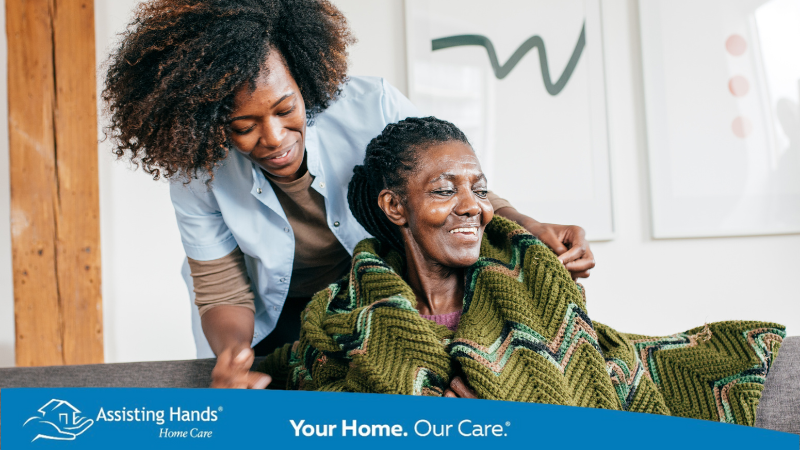
When elderly loved ones need extra support at home, families must weigh their options. Home care offers numerous key advantages, including one-on-one care, while assisted living comes with limited benefits. Here are reasons families should consider home care over assisted living.
Most older adults want to age in place. Their desire to live out their lives at home makes home care the preferred choice. Seniors receive care with all the activities of daily living from professional caregivers, who ensure that aging care recipients remain physically and emotionally healthy.
Assisted living, however, offers older adults less personalized care. Seniors admitted to these facilities receive care in apartment-style communities. They are provided with healthcare, socialization, and meals. Although seniors are hesitant about assisted living, some can grow to love their community.
What are the advantages of home care?
1. Smooth Transition to 24/7 Care
Assisted living facilities are staffed with aides and nurses who support the healthcare needs of residents. Mobile services for physician appointments may be available. While assisted living offers professional care services, the transition from intermittent care to 24/7 care poses as a challenge.
Older adults who reside in assisted living facilities demonstrate a level of self-sufficiency. Assisted living facilities normally do not provide 24/7 medical support. If an elderly resident begins to need around-the-clock care, their next care facility is likely to be a nursing home.
Home care, however, simplifies the transition to 24/7 care. Home care agencies delivering in-home care to the senior can easily accommodate around-the-clock care needs. The majority of home care agencies are staffed with live-in caregivers as well as teams of 24-hour caregivers.
2. One-to-One Care
An additional benefit provided by home care agencies is that care is provided on a one-to-one basis. Professional caregivers take the time to become acquainted with care recipients, serving as not only care providers but companions. The elderly thereby enjoy the social benefit of having a consistent caregiver.
Relationships are built as the professional caregiver takes the senior on safe outings, encourages them to pursue enjoyable hobbies, joins them in recreational pursuits, and holds pleasant conversations. Seniors thrive socially with the one-on-one care provided by home care providers.
If a senior transitions to a nursing facility upon needing around-the-clock care, they are not availed the opportunity to receive one-to-one care. Numerous staff rotate to provide care services. While this setup delivers adequate care, it is not done in a personalized manner.
3. Customizable Care
A third important advantage of home care is that care is customizable. Seniors who enjoy being socially active are paired with a home care professional who transports them to the senior center, social events in the community, or simply serves as a source of invaluable companionship.
On the other hand, an elderly care recipient who prefers quiet afternoons at home is fully supported by professional caregivers who tend to their daily non-medical needs. The caregiver may focus on cooking healthy meals, cleaning the home, or providing craft supplies to encourage a hobby.
4. Less Expensive than Assisted Living
Assisted living is costly, averaging $4,500 per month. The high price itself is a major drawback for families. Worsening financial matters for families is when the senior must be transitioned from the assisted living facility to a nursing home, where expenses are exponentially higher.
Conversely, home care is an affordable option for families and their elderly loved ones. Home care costs are dependent on the number of hours a caregiver spends with the senior. Most home care agencies charge by the hour, with the median hourly charge being $26.
A further advantage of utilizing a home care agency is the support their staff provide to help families connect with elder care resources. Home care specialists are knowledgeable about local resources that are useful to seniors, including organizations that provide guidance with financial issues.
Home care agency professionals can direct the elderly to resources that help the senior understand reverse mortgages, which often helps pay for home care services. Elderly life insurance policy holders can convert their policy into cash or home care services. Home care loans are also available.
Staff at home care agencies connect seniors with their local Area Agency on Aging, an organization that is staffed with benefits counselors who can advise on financial matters. Geriatric care managers are another resource; these professionals help seniors with financial planning.
Ask Assisting Hands

Before deciding between home care or assisted living, families should assess the type of care the senior will need. Call Assisting Hands to understand what to expect from in-home care and assisted living.
Older adults who feel they would benefit from compassionate one-to-one elder care are encouraged to choose a reliable home care agency, like Assisting Hands Home Care. Our professional caregivers offer customizable care that can be adjusted as the senior’s care needs change over time.
Seniors in our care enjoy flexible scheduling. Our caregivers are available to provide respite care for short-term care needs, and 24-hour care for seniors requiring continual monitoring. Transitioning to 24/7 care is less stressful when families work with us.
Assisting Hands Home Care also provides care designed to meet the unique care needs of seniors. We provide quality Alzheimer’s and dementia care as well as companion care to keep seniors socially active. All our care services include assistance with the activities of daily living.
Our non-medical care is comprehensive, designed to meet the daily needs of seniors. Typical caregiver responsibilities include support with personal hygiene tasks, meal preparation in accordance with the senior’s dietary restrictions, grocery shopping, transportation to doctors’ offices or senior centers, light housekeeping, and medication reminders.
When your aging loved one is ready for extra support, turn to Assisting Hands Home Care, like so many families in Villa Park, Illinois, continue to do. Schedule an in-home consult, where we’ll assess care needs and develop a personalized care plan. Call us today at (630) 526-6522 to start quality senior home care.















